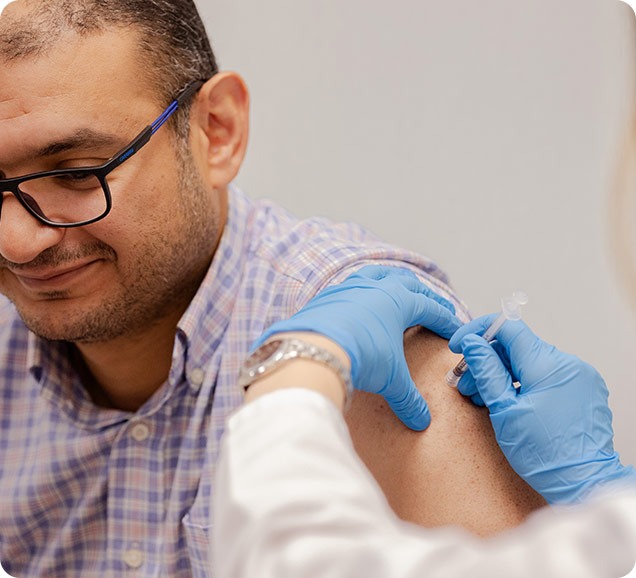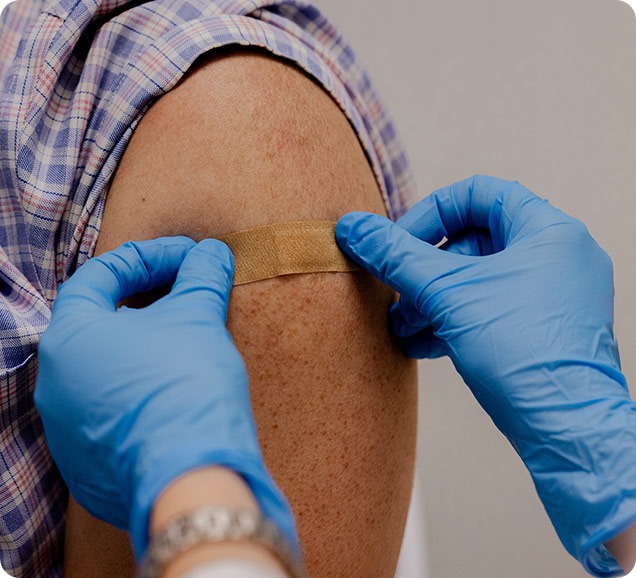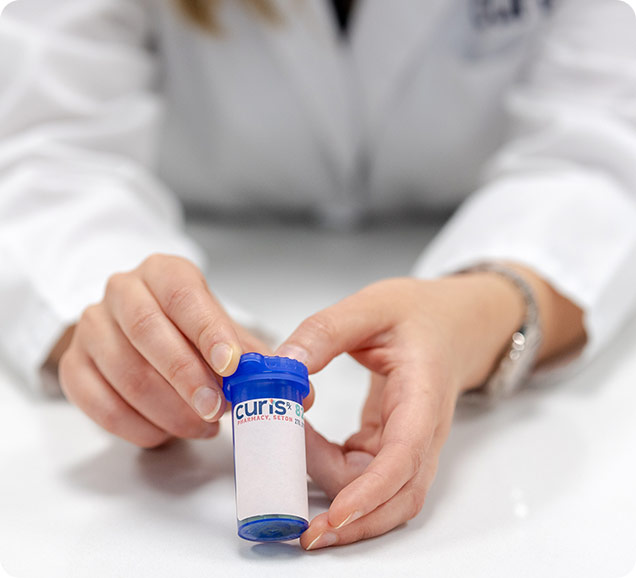At CurisRx Pharmacy, we care about your overall health, well-being, and safety. We are pleased to offer comprehensive disease information, along with vaccinations. We provide routine vaccines, vaccines to protect against mosquito-transmitted diseases, vaccines to protect against food and water-transmitted diseases, and other vaccines including those to protect against animal-transmitted diseases and human-to-human transmitted diseases. Various health risks, which have associated vaccinations available, include:
Your Choice for Vaccinations and Disease Information in Calgary & Rocky View County



Malaria

Malaria is a disease spread by mosquitoes that are infected with parasites. Following a bite by an infected mosquito, it usually takes 7-30 days for symptoms to appear. Mild symptoms include chills, muscle aches, headache, cough, fever, and diarrhea. Malaria can often be cured if it is treated promptly. In more serious cases, malaria can cause seizures, abnormal behavior, severe anemia, coma, kidney failure, low blood pressure, and many other symptoms. Severe malaria is considered an emergency and should be treated immediately.
Japanese Encephalitis

Japanese encephalitis is a disease involving inflammation of the brain caused by a viral infection. It is spread by infected mosquitoes. The risk for developing Japanese encephalitis is in Asian countries, although the risk is very low. It increases in agricultural and rural areas and for those traveling to affected areas for periods greater than one month. Symptoms of Japanese encephalitis include fever and headaches, and while usually mild, 1 person for every 200 infected can develop a more serious infection with rapidly worsening symptoms including headaches, fever, neck stiffness, seizures, coma, paralysis and death. Approximately 1 in 5 people with a serious case of Japanese encephalitis will develop long-term complications and up to 30% of those with serious infection may die. Symptoms generally develop 5-15 days after being bitten by an infected mosquito.


Yellow Fever

Yellow fever is a disease transmitted by mosquitoes. It can cause no symptoms in some people, while in others it can cause serious symptoms or even death. Initial symptoms usually include chills, fever, body aches, severe headaches, nausea, and weakness. Most people will improve after developing symptoms. Approximately 1 in 7 people will develop a more severe case involving jaundice, high fever, bleeding, and eventually shock and organ failure. There is no specific cure or treatment for yellow fever, and treatment is aimed at managing symptoms. Symptoms usually develop 3-6 days after being bitten by an infected mosquito. Travelers to certain countries in Sub-Saharan Africa and tropical South America are required to be vaccinated before entering the country.
Rabies

Rabies is a viral infection transmitted through contact with infected animals. The virus is found in animal saliva and can be spread to humans through animal scratches, bites, or licks over compromised human skin through cuts or exposed mucous membranes. Initial symptoms included headache, fever, muscle aches, tiredness, and tingling or numbness at the site of the scratch or bite. Untreated, it can develop into a more severe disease where hyperactivity, hallucinations, paralysis, or seizures occur. After symptoms appear, treatment will not help and death will result. Symptoms of rabies usually develop 20-30 days after the animal contact. Travelers to areas that have widespread risk of rabies, as well as areas where there is unknown or poor access to safe and adequate post-exposure management, as well as long-term and frequent travelers to high-risk areas should consider rabies vaccination. Children, especially those who are too young to understand the need to avoid animals or to report a traumatic animal contact should receive a pre-exposure immunization when traveling to endemic areas.


Meningococcal Disease

Meningococcal disease covers a specific group of bacteria that can cause meningitis. Meningococcal meningitis is the inflammation of the tissue surrounding the brain and can lead to death if not treated. It is spread through the transmission of droplets of fluid or mucus from the nose or throat. Symptoms include high fever, stiff neck, confusion, headache, sensitivity to light, and vomiting. Symptoms usually develop 3-4 days after exposure to the bacteria. Vaccines are provided to Canadian children, but some adults may want to consider a booster dose. Travelers headed to destinations where the risk of meningococcal is high should be vaccinated. Some countries, like Saudi Arabia, may require proof of meningococcal immunization for travelers, depending on the purpose of travel. Adults and children over the age of 2 must receive one dose of meningococcal vaccine and also show proof of vaccination on a valid international Certificate of Vaccination. Vaccinations should be given no less than 10 days before arrival in Saudi Arabia.
Hepatitis A

Hepatitis A is caused by a virus found in contaminated water or food, or by direct contact with a person with Hepatitis A. Symptoms include loss of appetite, nausea, weight loss, rashes, dark urine, joint pain and yellowing of the skin and eyes. For most people, symptoms usually resolve fully with the help of our immunization system. However, there is a risk of developing serious complications including liver failure. Symptoms usually appear 2-4 weeks after the consumption of water or food contaminated with hepatitis A. Hepatitis A is one of the most common vaccine-preventable diseases in travelers, and therefore it is recommended that all travelers to most countries outside of Canada be vaccinated.


Hepatitis B

Hepatitis B is a viral disease that is spread through contact with bodily fluids containing Hepatitis B. Contact with contaminated tattoos or surgical instruments or sexual intercourse are examples of ways it can be contracted. Symptoms of hepatitis B include yellowing of the eyes and skin, loss of appetite, dark urine, and mild fever. Hepatitis B is the most serious type of hepatitis and causes serious complications including liver failure, cirrhosis, and liver cancer. It kills over 780,000 people annually worldwide. Symptoms usually develop 2-5 months after exposure.
Typhoid

Typhoid is an infection caused by bacteria through the consumption of water or food that is contaminated with the bacteria salmonella typhi. The infection causes symptoms including headaches, high fever, stomach pains, weakness, loss of appetite or rash. 1 in 10 people will experience complications of typhoid, which can include infection in the brain, seizures, pneumonia, inflammation of the heart and death. Symptoms usually occur about a week after the consumption of contaminated water or food. The risk of developing typhoid exists in many parts of the world including Asia, Africa, and Latin America. Small outbreaks have occurred in Eastern Europe. Health Canada recommends those traveling to South Asia be vaccinated. The vaccine may also be recommended for those who travel regularly, are traveling to developing countries, or are traveling for extended periods.


Diphtheria

Diphtheria is a respiratory disease that is spread by bacteria which infect the airways and throat. Transmitted by sneezing and coughing, it is easily spread from person to person. Symptoms include fever, sore throat, and swollen glands in the neck. In more serious cases, infection may cause inflammation of the heart muscle or pain and numbness of the nerves in your arms and legs. Symptoms of diphtheria usually develop 2-5 days after exposure. Complications from Diphtheria may include death, so it is very important to seek medical attention if you suspect you have diphtheria. Travel is a great opportunity to provide Diphtheria immunization to adults who have not previously been vaccinated. A 3-dose series should be given to unimmunized adults. For the immunization of adults who have not been immunized against polio, all doses should contain polio vaccine. Adults who have previously been immunized should receive a booster dose of diphtheria-containing vaccine every 10 years.
Tetanus

Tetanus is an infection caused by spores of bacteria that enter the body through a cut in the skin. This can be from more serious injuries like stepping on a sharp object like a rusty nail, or through wounds that are less deep and serious. Tetanus spores can be found in dirt, dust, and manure, and are therefore ever-present and universal. Unlike many other illnesses, tetanus is not contagious and cannot be spread from person to person. It causes very serious symptoms and complications, particularly to the nervous system, which include dysfunction of the nervous system leading to stiffness of the jaw, and muscle spasms, and can later lead to paralysis and death. Because of the very serious risks, it is important to seek immediate attention if you are cut and are not sure if your vaccination against tetanus is up to date. Symptoms develop anywhere between 3 days and 4 or more weeks after sustaining an injury.


Pertussis

Pertussis, otherwise known as whooping cough, is a contagious bacterial infection of the airways and lungs that is easily transmittable from person to person through the air. Symptoms include stuffed up or runny nose, low-grade fever, mild occasional cough, apnea, and cyanosis in babies and young children. For the prevention of pertussis, a pertussis-containing vaccine is recommended for any adult who has not previously received a dose in adulthood. A pre-travel consultation with your CurisRx Pharmacy team member is an opportunity to receive the adult booster for those who may not otherwise seek immunization from a vaccine provider.
Measles, Mumps and Rubella Vaccine

Measles, mumps, and rubella are viral diseases that may negatively affect non-immune pregnant women and their fetuses/neonates. Because measles, mumps, and rubella are endemic in many countries, protection against these diseases is particularly important for travelers. Travelers born after 1970, who do not have evidence of receiving 2 doses of MMR vaccine on or after their first birthday, or laboratory evidence of immunity, or a history of confirmed measles, should be vaccinated. MMR vaccine may be given as early as 6 months old for children traveling outside of Canada where this disease is of concern, or those traveling to locations experiencing any outbreaks. However, 2 additional doses of measles-containing vaccine must be administered after the child is 12 months old to ensure long-lasting immunity to measles.


Dengue

Dengue is a disease spread by mosquitoes. The risk for dengue exists in over 100 countries and continues to spread into new areas. The risk of contracting it is higher during the day than at night, which contrasts with other mosquito-transmitted diseases. Symptoms are usually mild and can include mild flu-like symptoms like headache, fever, muscle and joint pain, and nausea. Mild symptoms generally resolve on their own. Some people will have more serious symptoms, which can include persistent vomiting, abdominal pain, trouble breathing, and blood in vomit. Most serious cases can be managed with proper hospital care and thus it is important to seek medical attention if you experience these symptoms while traveling. Symptoms often appear 5-8 days after being bitten by an infected mosquito.
Chikungunya

Chikungunya is a viral infection transmitted by mosquitoes. There is no vaccine to prevent the development of Chikungunya, therefore it is important to avoid mosquitoes while traveling. Infected mosquitos are more active during the day than at night, which contrasts with other mosquito-borne illnesses like malaria. Select countries in South America, North America, Asia, Europe, and Africa contain mosquitoes that could spread the virus. The most common symptoms of Chikungunya include joint pain and fever which will resolve on their own after a week for most people. In some people, however, joint pain can continue for several months. Symptoms usually appear 3-7 days after being bitten by an infected mosquito.

We look forward to hearing from you soon!
To speak with a dedicated CurisRx Pharmacy Team member today:
Call our Seton location at (825) 413-6202
Call our Kingsland location at (403) 300-1407
Call our Mahogany location at (403) 299-5808
Call our Harmony location at (403) 863-6535

